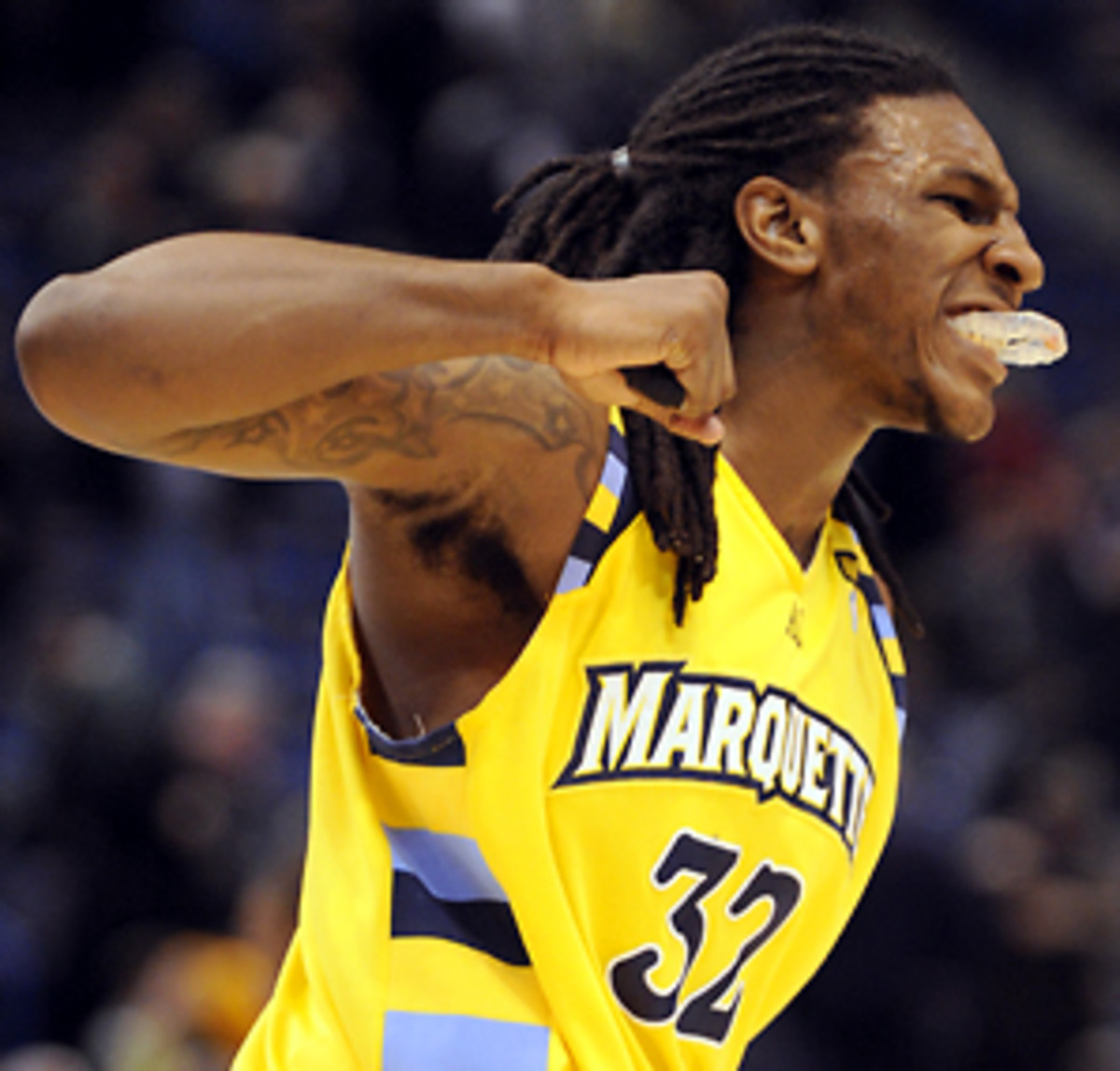
Marquette getting used to grueling life on the bubble
HARTFORD, Conn. -- What does life on the bubble look like?
For two hours last Thursday, Marquette head coach Buzz Williams clapped and stomped, lambasted and then urged on his Golden Eagles during the latest in their seemingly endless litany of close games. And as the final seconds of a pulsating overtime win over Connecticut ticked away, Marquette forward Jae Crowder pumped a fist, almost bit through his mouthpiece with tightly clenched teeth and then pointed to the Marquette radio crew on press row in celebration.
What does life on the bubble feel like?
Some 30 minutes after the game, Williams had changed into some warmups and was flat worn out, seeking out a lone chair in an empty part of the XL Center's court-level concourse in order to chat. Soon after, Crowder, with the smile of victory still on his face, came off the team bus to conduct an interview with an ice pack tightly wrapped around his left forearm.
What does life on the bubble do to a program when it spends two solid seasons there, playing a staggering 29 games decided by six points or fewer or in overtime in that span ?
Unprompted, Williams easily cited a flood of numbers about how many ranked teams Marquette (18-11, 9-7 Big East) had faced, its average margin of defeat this season, even time and game-situation specifics of his worst loss at Marquette, 80-57 to Georgetown in last year's Big East tournament. The grind, for him and his team, has basically become all-consuming.
"It's aged me," Williams said. "It's made me a lot better coach. It's made me very thoughtful in our preparation."
"I heard a lot of things coming into it, but really words can't explain how tough it is night in and night out," chimed in Crowder, who just joined the team this season after a standout juco career. Then he added one more crucial sentence. "But if you're a true basketball player, this is what you want. This is what you play for, coming in and having a game like this."
Indeed, this is what Marquette basketball has become: a hard-nosed, hard-working team that somehow, someway, always finds itself in close games and is embracing that identity. It's almost become self-fulfilling.
If the Golden Eagles lead late, you expect something weird to happen. If they're trailing, you assume shots will suddenly fall. No lead is safe. No lead is insurmountable. Not even Williams can really figure out what this says about him and his program, which has gone an unremarkable 13-16 in the aforementioned tight games and, statistically, has been one of the nation's most unlucky teams in each of the past two seasons.
"There's always different ways to look at things," Williams said. "You can say we've played a lot of close games because we're not good enough. You can say we've played a lot of close games because we've overachieved."
Williams may not fully understand the why, but he's definitely working to handle the what. He noted that his program's penchant for tight contests has forced him to overhaul his practice plans, with a significantly higher emphasis placed on special situations like out-of-bounds plays, plays out of timeouts, late-game fouling and free-throw shooting. Williams breaks drills down into micro-segments, with his two practice teams contesting two-minute games or even games featuring a series of individual possessions that can be won by scoring or denying a basket. The team that wins those drills must close the deal with a unique flourish.
"When we started out league play last year 1-4, what we started doing in between each of the drills that we do is kind of like what you used to do as a kid," Williams said. "You played pickup. Your team wins and somebody on your team needs to make a free throw to 'confirm' the victory. So what we started to do was confirming the victory with a special situation."
So now at Marquette's practices, no drill is won until the winning team makes a pressure free throw or executes an inbounds correctly. Each game-winning play is a reminder of how precious each trip down the floor is, of what Marquette needs to do to better close out the types of games it's routinely in, of how, in Williams' words, the Golden Eagles must "steal possessions."
The lessons are sinking in. Crowder noted he had been put on the line in pressure spots in practice all week and knocked down the free throws, then lamented bricking the front end of a crucial 1-and-1 against the Huskies. Darius Johnson-Odom, whose late-game heroics saved the Golden Eagles, talked about all of the extra running and conditioning the Golden Eagles had done in practice last week, to stay physically fit enough to deal with this grind and mentally sharp enough to execute with that fatigue.
"I think they're prepared," Williams said of the impact of these reworked practices. "I don't think they're caught off guard. I don't think that playing on the road bothers them. I think it allows them to be more consumed with the game. It's like anything else, good or bad. When you do anything over and over and over and over, it becomes what we do."
After two seasons of this, they no longer know any other way.





